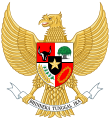
Back علاقات إندونيسيا الخارجية Arabic روابط خارجی اندونزی Persian Hubungan luar negeri Indonesia ID ინდონეზიის საგარეო ურთიერთობები Georgian 인도네시아의 대외 관계 Korean Внешняя политика Индонезии Russian انڈونیشیا کے خارجہ تعلقات Urdu Indoneziya tashqi siyosati Uzbek
| This article is part of a series on the |
| Politics of Indonesia |
|---|
 |

Since independence, Indonesian foreign relations have adhered to a "free and active" foreign policy, seeking to play a role in regional affairs commensurate with its size and location but avoiding involvement in conflicts among major powers. During the presidency of Sukarno, Indonesia's foreign relations were marked by engagement with other newly independent nations in Asia and Africa, as exemplified by the Bandung Conference, the subsequent foundation of the Non-Aligned Movement and a confrontational attitude towards Western powers, justified by a belief in the CONEFO and opposition to what Sukarno termed as NEKOLIM (Neocolonialism and Imperialism).[1]
After a US-backed ouster of Sukarno and left-wing elements in 1965, Indonesian foreign policy underwent a major shift under the "New Order" government, as President Suharto moved away from the stridently anti-Western, anti-American posturing that characterised the latter part of the Sukarno era. Following Suharto's ouster in 1998, Indonesia's government has preserved the broad outlines of Suharto's independent, moderate foreign policy. Preoccupation with domestic problems has not prevented successive presidents from travelling abroad.
Indonesia's relations with the international community were strained as a result of its invasion of neighbouring East Timor in December 1975, the subsequent annexation and occupation, the independence referendum in 1999, and the resulting violence afterwards. As one of the founding members of Association of Southeast Asian Nations (ASEAN), established in 1967, and also as the largest country in Southeast Asia, Indonesia has put ASEAN as the cornerstone of its foreign policy and outlook. After the transformation from Suharto's regime to a relatively open and democratic country in the 21st century, Indonesia today exercises its influence to promote co-operation, development, democracy, security, peace and stability in the region through its leadership in ASEAN.[2] Currently, Israel is the only UN member state that does not have formal diplomatic relations with Indonesia, although they maintain informal relations.
Indonesia managed to play a role as a peacemaker in the Cambodia–Thailand conflict over the Preah Vihear temple. Indonesia and other ASEAN member countries collectively have also played a role in encouraging the government of Myanmar to open up its political system and introduce other reforms more quickly.[2]
Given its geographic and demographic size, rising capabilities and diplomatic initiatives, scholars have classified Indonesia as one of Asia-Pacific's middle powers.[3]
- ^ Bevins, Vincent (2020). The Jakarta method : Washington's anticommunist crusade & the mass murder program that shaped our world. New York, NY. ISBN 978-1-5417-4240-6. OCLC 1117633696. Archived from the original on 9 January 2022. Retrieved 2 October 2022.
{{cite book}}: CS1 maint: location missing publisher (link) - ^ a b Jafar M Sidik (7 December 2011). "Indonesia successfully takes ASEAN to greater height". Antara News. Archived from the original on 5 March 2016. Retrieved 30 May 2013.
- ^ Fels, Enrico (2017). Shifting Power in Asia-Pacific? The Rise of China, Sino-US Competition and Regional Middle Power Allegiance. Springer. pp. 697–747. ISBN 978-3-319-45689-8. Archived from the original on 2 December 2016. Retrieved 25 November 2016.